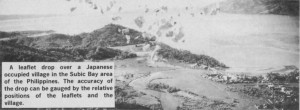- Author
- Proud, J.C.R, Commander
- Subjects
- None noted
- Tags
-
- RAN Ships
- None noted.
- Publication
- December 1971 edition of the Naval Historical Review (all rights reserved)
Biographical Note: J. C. R. Proud, CBE, VRD. Served with RANVR, 1939-45. Director FELO, 1942-45. After war, served with the British Foreign Office and later with the Colonial Service in China, Malaya, the Caribbean, Kenya and Cyprus. 1961-68, Director of the Centre for Educational Television Overseas, in London. Now retired. Decorations: OBE (Mil.), 1945, CBE (Civil) 1958
If LIEUT. COMMANDER R. B. M. (COCKY) LONG had not been passed over for promotion and given a desk job in Melbourne as Director of Naval Intelligence, the history of war in the South West Pacific might have been very different. He, with Wally Brooksbank, who was civil assistant to DNI, were to be primarily responsible for the establishment of a wartime Intelligence organisation which was to play a significant part in the campaigns in New Guinea and the Solomons, and later in what was then the eastern part of the Netherlands Indies.
In the years before the war, Long planned and organised the Coastwatching system in the islands to the north. Its story has been told in The Coast Watchers by its first commanding officer, Eric Feldt. Its part in supplying the intelligence which led to the defeat of the Japanese in Guadalcanal and New Guinea is well known. But Long saw further than this. In consultation with Admiralty, he placed Admiralty Reporting Officers in Portuguese Timor and the Netherlands Indies and arranged for RAN Intelligence personnel to be seconded to the HQ in Singapore of Admiral Layton, then C-in-C China Squadron. I was one of these officers and found myself acting as political intelligence officer concerned with Japanese operations in China and their intelligence activities in South East Asia.
 Shortly before the fall of Singapore I was posted to Java. After the battle of the Java Sea, I was one of the fortunate ones able to escape the Japanese net, and reached Fremantle in mid-March 1942. I reported to DNI in Melbourne at the same time as Lieut. Col. Egerton Mott of the Special Operations Executive (SOE), who had been sent by London to advise on establishing an Australian division to carry out sabotage and intelligence operations in what was to become the South West Pacific Area. Captain Kendall had also arrived from London on a similar mission. He represented the United Kingdom Secret Intelligence Service (SIS). My own field was organisation of native resistance to the enemy by propaganda and infiltration and the subversion of enemy morale.
Shortly before the fall of Singapore I was posted to Java. After the battle of the Java Sea, I was one of the fortunate ones able to escape the Japanese net, and reached Fremantle in mid-March 1942. I reported to DNI in Melbourne at the same time as Lieut. Col. Egerton Mott of the Special Operations Executive (SOE), who had been sent by London to advise on establishing an Australian division to carry out sabotage and intelligence operations in what was to become the South West Pacific Area. Captain Kendall had also arrived from London on a similar mission. He represented the United Kingdom Secret Intelligence Service (SIS). My own field was organisation of native resistance to the enemy by propaganda and infiltration and the subversion of enemy morale.




